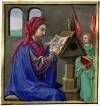
One of the talks we had at this Inclusive Church conference was on “Inclusion in the Old Testament”.
Part of the role of being the “chosen people” was to keep the nation “pure”, an approach well illustrated by the entry into the Promised Land where the instruction was to slaughter every resident tribe so that intermarriage might not take place, and that the young would not be corrupted by foreign worship and gods. Yet this wholesale genocide never seems to have been followed to the letter, for these pagan peoples continue to be a problem for the Israelites throughout the Hebrew Scriptures. And slowly the idea grew that these Gentiles could be accommodated within the chosen people, an approach given in Isaiah (56: 3-5) where the prophet writes: “Do not let the foreigner joined to God say, ‘God will surely separate me from God’s people …’ For thus says God … ‘I will give, in my house and within my walls, a monument and a name better than sons and daughters; I will give them an everlasting name that shall not be cut off.’”
We looked at the story of Ruth, the grandmother of King David (and thus part of the genealogy of Jesus), a foreigner who arrives in Bethlehem and establishes her place within the community.
The love between Jonathan and David was examined, where it becomes clear that the passion is more on Jonathan’s side, who is clearly infatuated with the shepherd boy. In their first recorded meeting, Jonathan’s response is to take off all his clothes, yet later passages show that whilst David may have been extremely fond of the prince, he viewed him as one of his wives, though maybe a “supra-wife”. Jonathan seems to be taking the feminine role. He starts out privileged and ends up marginalised because of this relationship. It is impossible not to recognise that there is a physical sexual love between these two, and without Jonathan’s love David would not have risen to prominence, and the line of Jesus would not have become established.
We then looked at the story of Tobiah the Ammonite in the book of Nehemiah. Nehemiah was a civil servant in the Persian Empire who saw an opportunity to become the next Governor of Judah and he began to rigidly interpret the exclusions of Deuteronomy. Tobiah, though a foreigner, was an integrated member of the Jewish community, part of those whose descendants had stayed in Jerusalem and not gone into exile, yet he finds himself on the wrong side of Nehemiah’s pogrom despite being well-respected by his peers. This cautionary tale illustrates the dangers of a Covenant theology, for a Covenant sets boundaries as to who is “in” and who is “out”. This may resonate with the debate over the proposed Anglican Covenant.
The final thought we were left with was that we should stop trying to find a voice to obey in the Bible, and instead delve into the conversations there and learn from them.





Wow! I have a lot to digest here. Excellent thoughts!
ReplyDelete